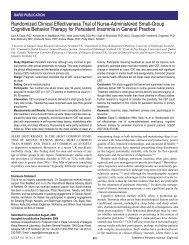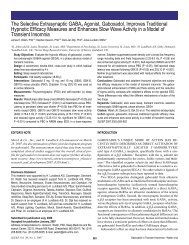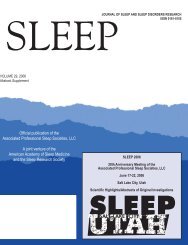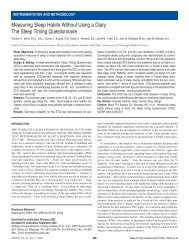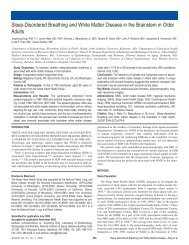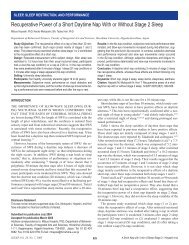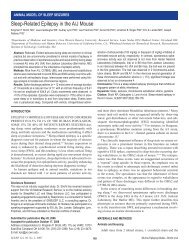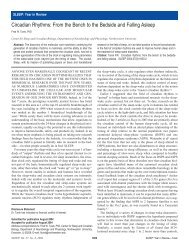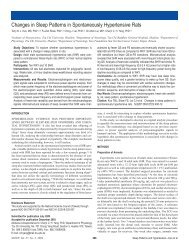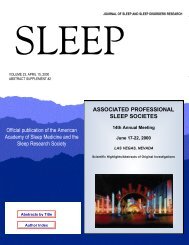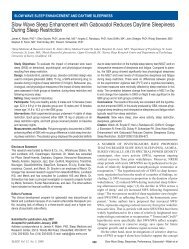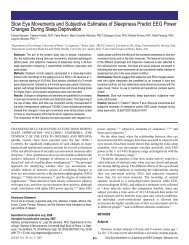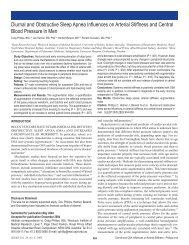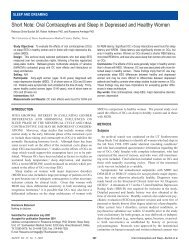SLEEP 2011 Abstract Supplement
SLEEP 2011 Abstract Supplement
SLEEP 2011 Abstract Supplement
You also want an ePaper? Increase the reach of your titles
YUMPU automatically turns print PDFs into web optimized ePapers that Google loves.
B. Clinical Sleep Science VIII. Medical Disorders and Sleep<br />
0675<br />
A RANDOMIZED, DOUBLE BLIND, PLACEBO<br />
CONTROLLED STUDY ON THE EFFECT OF SILDENAFIL<br />
IN AUTONOMIC NERVOUS SYSTEM RESPONSE DURING<br />
<strong>SLEEP</strong> IN OBSTRUCTIVE <strong>SLEEP</strong> APNEA SYNDROME<br />
Roizenblatt S, Neves C, Chediek F, Tufik S<br />
Psicobiologia, Universidade Federal de São Paulo (UNIFESP), São<br />
Paulo, Brazil<br />
Introduction: We have previously demonstrated that sildenafil can<br />
impair sleep related respiratory parameters, in obstructive sleep apnea<br />
syndrome (OSAS). Increase in obstructive events and desaturation of<br />
oxyhemoglobin may influence autonomic response during sleep. The<br />
objective of this study was to evaluate autonomic response in OSAS<br />
patients after sildenafil 50 mg, at bedtime.<br />
Methods: Heart rate variability (HRV) was evaluated in the group of<br />
thirteen male OSAS patients of the previous study, who underwent<br />
all-night polysomnography after receiving sildenafil 50mg or placebo.<br />
Frequency-domain HRV was analyzed in 5-minute samples of stable<br />
SWS and REM including an apnea event and in 1-minute sample after<br />
recovery of respiration in NREM and REM sleep.<br />
Results: Comparing to placebo, during sildenafil night, increase in central<br />
AHI occurred in non-REM sleep, increase in obstructive AHI and<br />
also decrease in oxyhemoglobin saturation occurred in both non-REM<br />
and REM sleep. Additionally, arousal index and in LF/HF component of<br />
HRV were higher in REM sleep. Increase in HF and decrease in LF/HF<br />
in SWS and decrease in TP in REM were observed in the five-minute<br />
samples analysis. Regarding apnea and post apnea one-minute period<br />
evaluation, increase in HF occurred in post apnea, and TP variation<br />
was not significant nether in NREM, nor in REM sleep, with the use<br />
of sildenafil. Modifications of HRV and respiratory parameters of sleep<br />
were also evaluated. Correlation was found between modification TP<br />
in NREM sleep during apnea and AHI, between modification of HF in<br />
REM sleep and AHI, and arousal index. Multivariate analysis showed<br />
association of changes in LF/HF in REM sleep post apnea with modification<br />
of mean saturation induced by sildenafil.<br />
Conclusion: In severe OSA, the use of sildenafil 50 mg at bedtime plays<br />
a detrimental role on respiratory parameters in both non-REM and REM<br />
sleep, with fragmentation in REM sleep, increase in parasympathetic<br />
activity and blunted heart rate variability during apnea and a prolonged<br />
increase in LH/HF component of HRV after resumption of ventilation.<br />
Support (If Any): CEPID 1998/14303-3<br />
0676<br />
<strong>SLEEP</strong> QUALITY AND ASTHMA CONTROL IN NON-SEVERE<br />
AND SEVERE ASTHMA<br />
Luyster F 1 , Strollo PJ 2 , Wenzel S 2<br />
1<br />
School of Nursing, University of Pittsburgh, Pittsburgh, PA, USA,<br />
2<br />
Division of Pulmonary, Allergy, and Critical Care Medicine,<br />
University of Pittsburgh Medical Center, Pittsburgh, PA, USA<br />
Introduction: Sleep disturbances are commonly reported by individuals<br />
with asthma and are more severe in those with poorly controlled asthma.<br />
Gastroesophageal reflux disease (GERD) is considered a probable cause<br />
of poor sleep in asthma. We sought to determine if poor sleep quality<br />
can be explained entirely by GERD and whether sleep quality is associated<br />
with asthma control and asthma quality of life after controlling for<br />
GERD and other risk factors.<br />
Methods: Adults with severe asthma (SA), non-severe asthma (NSA),<br />
and normal controls (NC) enrolled in the Severe Asthma Research Program<br />
(SARP) completed the Pittsburgh Sleep Quality Index (PSQI),<br />
Epworth Sleepiness Scale (ESS), and Asthma Quality of Life Questionnaire<br />
(AQLQ). Asthma control consisted of items comparable those in<br />
the Asthma Control Questionnaire. Individuals using CPAP or BiPAP<br />
and/or were at high risk for obstructive sleep apnea were excluded.<br />
Results: A total of 333 patients (109 SA, 164 NSA, 60 NC) were included<br />
in the analyses. On average, SA had worse sleep quality (PSQI:<br />
10.1±3.1) than NSA patients (8.7±3.1) and each group had worse<br />
sleep quality than NC (6.8±2.5). SA patients had worse asthma control<br />
(3.9±1.3) and quality of life (4.2±1.3) than NSA (5.1±1.1 and 5.1±1.1).<br />
The majority of asthma patients had poor sleep quality regardless of<br />
GERD (with GERD; PSQI> 5: 93.6% and without GERD; PSQI> 5:<br />
87.7%). Poor sleep quality was associated with poor asthma control and<br />
worse asthma quality of life, independent of age, gender, GERD, body<br />
mass index, ESS, and oral corticosteroid use, in both NSA (β=-0.38,<br />
p



